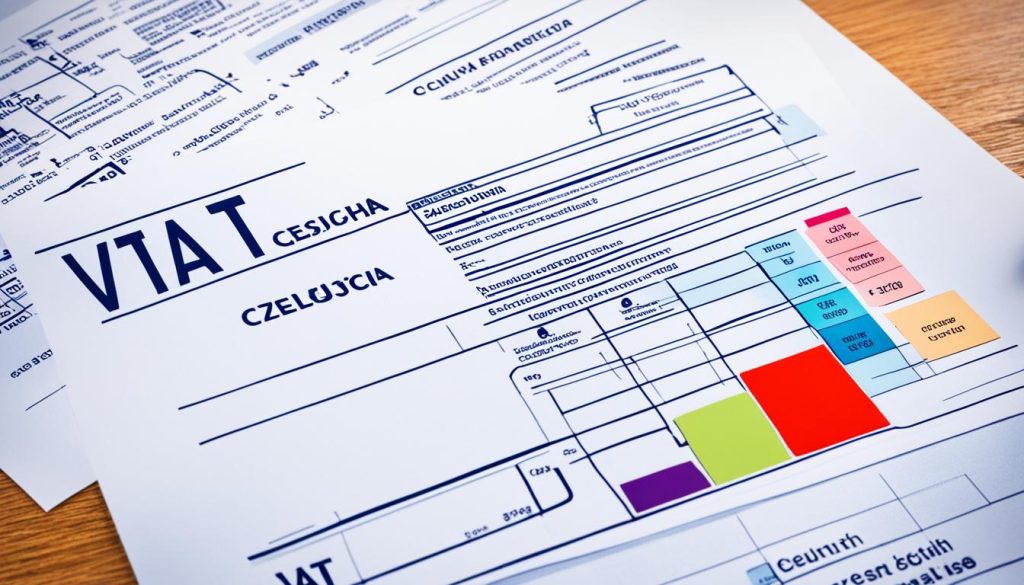Starting a new business is thrilling but scary. The Czech Republic is a great place for new business owners. It has a lively and stable atmosphere. This guide will show you how to set up a company in Czechia. You can benefit from its strong economy, central location in Europe, and talented workers. The Czech Republic is full of chances for a successful business.
The Czech Republic has a solid industry, innovative practices, and good tax rules, says Czech Invest. These are key for growing and making profits. The Ministry of Industry and Trade gives details on how to register a business. The Czech Business Web Portal also offers helpful advice on starting and running a business there.
This guide will help you understand the different kinds of businesses you can start. It will guide you through legal stuff too. Keep reading for tips and step-by-step directions on creating a successful business in the Czech Republic.
Key Takeaways
- The Czech Republic offers a stable and favourable business environment.
- Economic stability and strategic Central European location are significant advantages.
- Guidance from Czech Invest, the Ministry of Industry and Trade, and the Czech Business Web Portal is invaluable.
- The Czech Republic provides a range of business entity options to suit various needs.
- Navigating legal requirements and registration processes is straightforward with the right resources.
Why Start a Business in the Czech Republic?
The Czech Republic is a great place for entrepreneurs. It has a strong economy, is in a key spot in Europe, and the workers are very skilled. All these make the Czech Republic an attractive place for new businesses.
Economic Stability of the Czech Republic
The Czech Republic is known for its stable economy. The Czech Statistical Office shows it’s been growing steadily with low inflation for years. This makes it a safe and profitable place for businesses to grow.
Central Europe Location Advantages
Being in the middle of Europe gives the Czech Republic a big advantage. It’s like a door to the EU’s single market, offering access to millions of customers. The European Commission notes its location helps businesses expand easily in Europe.
Skilled Workforce and Labour Costs
The Czech Republic offers a skilled workforce at good prices. Studies show its workers are well-trained and experienced. Also, starting a business there doesn’t cost much because of low labour costs. This makes it a great place for efficient, quality business operations.
Types of Business Entities Available
Choosing the right business entity is key when starting up in the Czech Republic. There are different types, each offering their own benefits and drawbacks. It’s vital to understand these to pick the best structure for your business.
Limited Liability Company (s.r.o.)
The Limited Liability Company, or s.r.o., is a favourite among business types. It combines flexible management with limited liability for its shareholders. To start an s.r.o., you need to sign up with the Czech Commercial Register. It’s perfect for small to medium businesses due to its easy handling of liability and administrative tasks.
Joint-Stock Company (a.s.)
Big companies often go for a Joint-Stock Company, or a.s., because it helps them to gather money by selling shares. It gives a lot of protection to shareholders but needs more money to start and follows strict rules. The a.s. setup is ideal for firms that want to grow big and attract hefty investments.
Sole Proprietorship (živnost)
Sole Proprietorships, or živnost, are perfect for solo entrepreneurs and freelancers. This simple business form lets you set up and operate easily. But, the owner faces personal liability for any business debts, so it’s better for ventures with little risk involved.
Branch Office
Foreign businesses aiming at the Czech market may start with a branch office. This acts as part of the parent company and eases the way into the market. With low initial costs and adherence to local rules, it’s an ideal step for going global without complete autonomy.
| Entity Type | Key Features | Suitable For |
|---|---|---|
| Limited Liability Company (s.r.o.) | Limited liability for shareholders, flexible management | Small to medium-sized enterprises |
| Joint-Stock Company (a.s.) | Ability to raise capital through shares, extensive shareholder protections | Larger businesses seeking expansion |
| Sole Proprietorship (živnost) | Simple establishment, personal liability | Individual entrepreneurs, freelancers |
| Branch Office | Extension of the parent company, minimal setup | Foreign companies entering Czech market |
Legal Requirements for Starting a Business

Starting a business in the Czech Republic means you need to follow some legal steps. It’s important to do this to meet Czech company law and avoid future legal problems.
Business Registration
The first thing you need to do is register your business. The process is simple but needs your full attention. You have to give the right forms and documents to the Trade Licensing Office. Your business also needs to be in the Commercial Register.
Trade Licence
For most businesses, getting a trade licence in Czechia is required. The Trade Licensing Act says you need a licence that suits your business type. This licence is key for running your business legally and needs updating to stay valid.
Tax Identification Number
Getting a tax identification number is another key step. The Czech Ministry of Finance gives this out for tax matters. This number, or TIN, makes handling taxes easier and keeps you in line with Czech tax laws.
| Legal Requirement | Authority | Process |
|---|---|---|
| Business Registration | Trade Licensing Office | Submit forms and register in Commercial Register |
| Trade Licence | Trade Licensing Office | Apply based on business activity |
| Tax Identification Number | Ministry of Finance | Apply and receive TIN |
So, to start a business in the Czech Republic, you need to understand and follow these legal steps. It’s not just about following the law. It’s about setting a strong foundation for your business to succeed.
Choosing the Right Business Structure
Before you start a business in the Czech Republic, picking the right structure is key. This choice affects your legal duties, how much tax you’ll pay, and how easily you can get funds. We’ll discuss important things to keep in mind and share advice. Consulting services in Czechia are great for understanding this complex topic.
Factors to Consider
Before you decide on a business structure, you need to look at several things:
- Legal Liability: Think about how much personal risk you’re willing to take. Different setups offer different levels of safety.
- Tax Implications: Each choice has its own tax pros and cons. Knowing them can save you money.
- Capital Requirements: Think about the starting money required and if you need investors.
- Administrative Burden: Some structures need more paperwork and admin work.
- Future Scalability: Pick a structure that fits your future growth goals.
In Czechia, consulting services help a lot in looking at these things closely. Firms like PwC and Deloitte offer specialised advice for setting up a business, based on local laws and market.
| Structure | Legal Liability | Tax Considerations | Scalability |
|---|---|---|---|
| Limited Liability Company (s.r.o.) | Limited | Corporate Tax | High |
| Joint-Stock Company (a.s.) | Limited | Corporate Tax | Very High |
| Sole Proprietorship (živnost) | Unlimited | Personal Income Tax | Low |
| Branch Office | Parent Company Liability | Corporate Adam Hawley | Variable |
Expert Advice and Consultancy
Getting expert advice is crucial when setting up a business. In the Czech Republic, many advisory firms can help you choose the right structure. PwC and KPMG are examples of firms that provide detailed advice on each business type. They make sure you make an informed choice.
Market research shows more new businesses in Czechia choose Limited Liability Companies (s.r.o.). They balance liability protection and ease of admin. Business setup consulting services can guide you on these trends and what’s best for you.
How to Register Your Business
Starting a business in the Czech Republic involves following rules and submitting many documents. This guide will walk you through registering your business there. It will cover what documents you need and what costs to expect.
Steps for Registration
To make business registration in the Czech Republic easier, follow the guidelines provided by Czech Point. This service helps you with administrative tasks.
- Select the correct type of business (e.g., s.r.o., a.s., or živnost).
- Get the founding documents notarized by a recognized notary association.
- Sign up your business at the Czech Business Register.
- If your business needs one, get a trade licence.
- Sign up for tax ID with the Czech tax office.
Required Documentation
The documents you need depend on your business type. Notary associations in Czechia will tell you the legal bits, making sure your documents are correct.
- Articles of Association or founding contract
- Notarised signatures of company founders
- Proof of business address
- Trade licence if you need it
- Form to get a tax ID
Fees and Charges
Knowing how much registration costs in Czechia helps with planning your budget. Experts point out usual and unexpected fees in Czechia’s business registration. Here’s what you might pay:
| Cost Item | Estimated Amount (CZK) |
|---|---|
| Notarisation Fees | 3,000 – 5,000 |
| Business Register Filing Fees | 6,000 – 10,000 |
| Trade Licence Fees | 1,000 – 2,000 |
| Tax Identification Registration | No Charge |
Navigating the Tax System

Understanding taxes is key for businesses in the Czech Republic. We cover three critical areas: corporate income tax, VAT, and employee taxes. These insights help you navigate taxes smoothly.
Corporate Income Tax
The corporate tax is central in the Czech tax system. Companies pay a standard rate, which can change due to legislative updates. Knowing these changes is essential for financial management.
VAT (Value Added Tax)
If your business has enough sales, VAT registration in Czechia is a must. It’s wise to get advice from Czech tax law experts. They’ll help with getting a VAT number and keeping up with filings and payments.
Employee Taxes and Contributions
Handling employee taxes in Czechia must be done right to avoid fines and follow laws. Payroll firms are handy for managing these taxes and contributions. Knowledge in this area ensures trouble-free payroll processes.
| Tax Type | Applicable Rate | Notes |
|---|---|---|
| Corporate Income Tax | 19% | Standard rate, subject to change based on new legislation |
| VAT | 21% | Standard rate for most goods and services |
| Employee Income Tax | 15% | Applicable to employee earnings, excluding additional social contributions |
Understanding corporate tax, mastering VAT, and managing employee taxes lead to financial and operational success in Czechia.
Setting Up a Business Bank Account
Setting up a business bank account is key for your company in the Czech Republic. It’s important for all entrepreneurs, new and experienced, to know the requirements and steps. This knowledge makes banking simpler.
Choosing a Bank
Choosing the right bank is critical for your Czech business. The Czech National Bank lists all commercial banks, showing what they offer businesses. Look at fees, customer service, and any extra features to help with everyday banking. Česká spořitelna, Komerční Banka, and UniCredit Bank are among the top choices for corporate clients.
Required Documentation
To open a bank account in the Czech Republic, you’ll need specific documents. These include:
- Business registration certificate
- Tax identification number
- Identification documents of company representatives
- Proof of the legal address of the company
- Founding documents of the company (e.g., Articles of Association)
Process Overview
- Find a bank that suits your business needs.
- Collect all necessary documents, making sure they’re current and certified.
- Hand in the paperwork to your chosen bank, online or face-to-face.
- The bank will check your application, possibly including a background check on company reps.
- If approved, you’ll get your account details and can begin using your new bank account.
Taking advice from financial analysts and learning from other business owners can be very helpful. They provide insights that make setting up bank accounts in the Czech Republic easier.
Understanding Employment Laws
It’s key for businesses to understand Czech Republic’s employment laws. Knowing these regulations ensures that firms comply and run smoothly when hiring in Czechia.
Hiring Employees
In Czechia, companies must follow specific rules when hiring. These are set by the Czech Ministry of Labour and Social Affairs. They include non-discrimination, health and safety standards, and providing the right training.
Employment Contracts
Creating employment contracts in Czechia takes careful attention. Contracts should clearly state job duties, hours, pay, and how to end the contract. Getting help from labour law experts ensures that contracts follow all the rules, protecting everyone involved.
Employee Rights and Obligations
Employee rights and responsibilities are key in Czech employment law. Workers have rights to breaks, paid time off, and fair treatment. They must also stick to company rules, stay professional, and do their job duties. Learning about these through HR professionals helps create a respectful and productive work atmosphere.
Obtaining Necessary Permits and Licenses
In the Czech Republic, getting the right permits and licences is key to starting a legal business. Depending on your business type and what it does, you might need specific permits to run without issues.
First, local areas have their own rules for business activities. For example, a restaurant in Prague must have a food service licence. Meanwhile, a retail shop needs a trade licence. Working with local authorities makes sure you follow these rules.
Then, for some types of businesses like healthcare or finance, you need to deal with certain regulators. A healthcare business must get the nod from the Ministry of Health. A bank needs approval from the Czech National Bank.
Let’s see what permits different businesses need:
| Business Activity | Required Permits |
|---|---|
| Restaurant | Food Service Licence, Hygiene Permit |
| Retail Shop | Trade Licence |
| Healthcare Provider | Ministry of Health Approval |
| Financial Institution | Czech National Bank Licence |
Getting permits on time in Czechia is crucial to dodge legal issues. Studies show that delays can mess up business operations. They can also lead to fines.
To wrap up, it’s crucial to get the right permits for your business in the Czech Republic. This means talking to both local and industry-specific authorities. Doing so ensures your business runs smoothly and stays on the right side of the law.
Real Estate Considerations
Starting a business in the Czech Republic? It’s vital to find the right commercial space. Knowing the market and laws helps you move smoothly. It makes sure your enterprise starts on the right foot.
Office Space Rental
The Czech Republic’s lively business scene has boosted demand for Czech Republic office rental. Renting gives you flexibility, great for new businesses. Think about location, what’s included, and lease terms before you decide.
Commercial Property Purchase
For established companies, buying commercial real estate Czechia makes sense. Owning property gives you a fixed base and builds your assets. Talk to property experts and lawyers to get market insights and legal advice.
Legal Requirements
Following real estate law for Czech businesses is key, rent or buy. You need to know about zoning, understand your lease or purchase, and make sure everything’s legal. Look for business groups’ guides to help weigh your options.
| Aspect | Office Space Rental | Commercial Property Purchase |
|---|---|---|
| Flexibility | High | Low |
| Cost | Monthly Rent | One-time Purchase |
| Equity | None | Increases Over Time |
| Commitment | Short-term | Long-term |
Business Insurance in the Czech Republic
Business insurance is crucial for keeping companies safe in the Czech Republic. It helps businesses stay strong when facing risks. This article explores the different types of Czech business insurance and offers advice on picking the right coverage for you.
Types of Business Insurance
The Czech Insurance Association lists many corporate insurance policies Czechia for companies. The main ones are:
- Property Insurance: Protects physical assets against damage or loss.
- Liability Insurance: Covers legal liabilities and claims against the business.
- Business Interruption Insurance: Compensates for loss of income due to unforeseen disruptions.
- Employee Insurance: Ensures employee health and safety, including worker’s compensation.
It’s crucial to pick the right insurance to reduce risks and keep your business running smoothly.
Choosing the Right Coverage
Insurance experts advise doing a thorough risk check to find the best insurance coverage for Czech companies. Important things to think about include:
- Nature of Business: Different fields have their own risks and need specific insurance.
- Asset Valuation: Knowing your assets’ worth ensures they’re fully covered.
- Legal Requirements: You must meet laws specific to the Czech business world.
With this knowledge, companies can customize their corporate insurance policies Czechia for the best safeguard.
| Type of Insurance | Coverage Benefits | Suitability |
|---|---|---|
| Property Insurance | Protection against property damage or loss | All businesses with physical assets |
| Liability Insurance | Coverage for legal liabilities and claims | Businesses that might face legal actions |
| Business Interruption Insurance | Compensation for loss of income | Companies that can have operational issues |
| Employee Insurance | Coverage for employee health and safety | Any business with employees |
Marketing Your Your Business

Marketing in the Czech Republic offers unique challenges and opportunities. Businesses need to understand local consumers, use digital platforms well, and create strong networks. Below, we talk about key strategies to help market your business in Czechia successfully.
Local Market Analysis
An in-depth local market analysis is vital. Work with marketing agencies that know the Czech market to learn about consumer trends and habits. Knowing your competition and what the market wants can make your business sharper and more in tune with what customers want.
Digital Marketing Strategies
Digital marketing is booming in Czechia, thanks to more people being online and changing how they buy. Brands that do well, like Alza.cz and Mall.cz, show how effective digital marketing can be. Your business should focus on SEO, social media, and creating content that speaks to local people. Using local influencers, trying pay-per-click ads, and making sure everything works on mobile phones are key to a strong digital marketing strategy.
Networking and Partnerships
For B2B networking in Czechia, it’s crucial to make strong connections through networking and partnerships. Organizations such as the Czech Chamber of Commerce and the Business Leaders Forum are great for meeting others in your field. Getting involved in these groups can lead to partnerships and help your business grow.
By using these strategies, your business can do well in the Czech market. It’s all about combining online and offline methods to make a mark.
Financial Planning and Budgeting
Making a detailed business financial plan Czech Republic is key for entrepreneurs in the Czech market. It’s advised to start by setting your financial goals, figuring out how much money you need, and planning when you’ll make a profit. This planning is crucial for your business to grow and last.
Research on budgeting for startups in Czechia shows the need to list all costs. Think about fixed and variable expenses like rent, utilities, wages, marketing, and making products. A good budget covers your spending and helps find ways to save money.
Experts in Czechia say managing finances well is crucial for new businesses. Keeping a tight grip on your money early on can really shape your future. Doing things like
- checking your financial reports often
- watching your cash flow
- saving money for emergencies
helps deal with surprises and leads to success.
Your budget should also plan for ups and downs in money coming in and going out. Following these key financial practices helps startups tackle market challenges. This way, you can start strong financially.
Access to Funding and Investment
Finding money for your startup in the Czech Republic opens many doors for growth. Whether it’s initial funding, investment options, or loans in Czechia, knowing what’s available is key. This knowledge aids in making well-informed choices.
Government Grants and Subsidies
The Czech government has grants and subsidies to boost innovation and support new companies. Who gets these depends on the type of business, its size, and the project’s aims. Technology, research, and development ventures often fit the bill. Using government funds can lower startup costs and give new businesses a financial safety net.
Venture Capital and Angel Investors
For startups looking for venture capital or angel investors, Czechia is full of chances. The Czech Private Equity & Venture Capital Association (CVCA) helps entrepreneurs meet investors. These investors offer both money and their deep knowledge of the industry. They are perfect partners for growing your business.
Bank Loans and Financing
The Czech Republic’s banks have many loans for new businesses. They offer small loans and bigger credit options to fit various business plans and payback possibilities. Talking to banks about loans can push growth and make your startup more stable for the future.

















